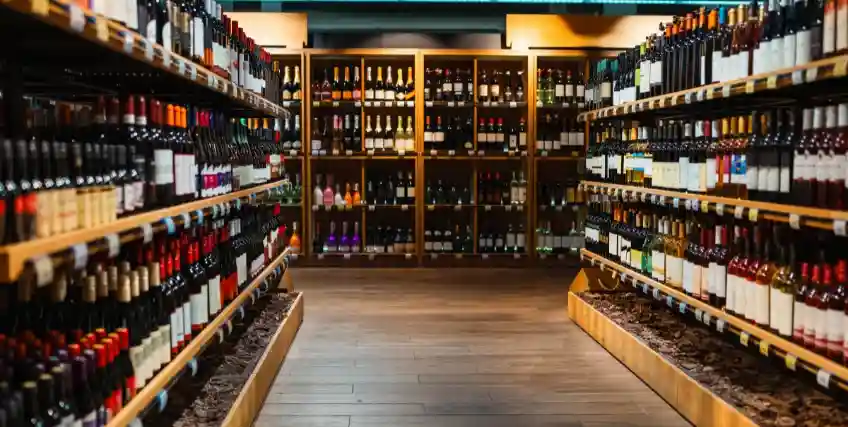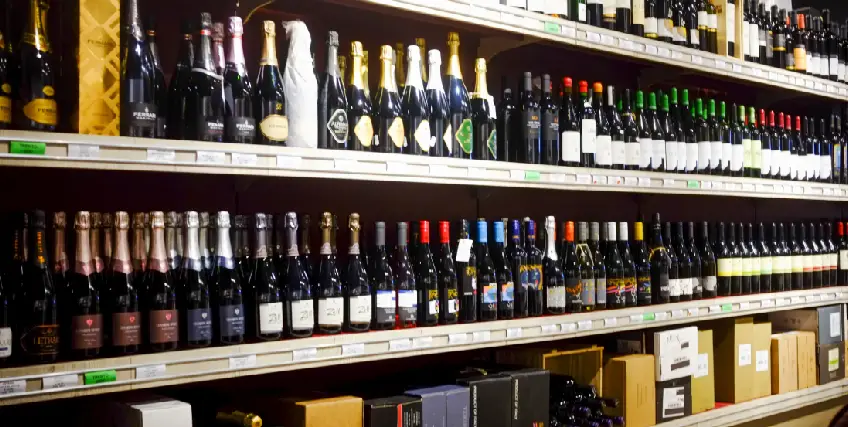How to Compare Lenders for Buying a Liquor Store
September 16, 2025 | Last Updated on: September 16, 2025

Buying a liquor store can be a smart move for entrepreneurs seeking a profitable, recession-resistant business. With strong cash flow potential and steady demand, liquor stores are often seen as attractive investments.
If you’ve decided that being a liquor store owner is right for you, securing the right financing is one of the most critical first steps in the process. Comparing lenders effectively can make or break your success, whether you're purchasing your first liquor shop or expanding an existing group of stores.
The terms of your new business loan will directly affect your cash flow and repayment flexibility. From loan options and interest rates to liquor industry laws and lender experience, here’s a look at everything you need to consider before buying a liquor store.
Understanding the Financing Needs of Buying a Liquor Store
Deciding to establish or buy a liquor store Is marking the first step towards liquor store ownership.
Before you’re ready to reach out to lenders and get funds, though, take some time to define exactly what it is you're financing. The startup cost of buying a liquor store is more than just paying the purchase price on a building. You may also need funds for things like store inventory, liquor licenses, point of sale or POS systems, renovations, staffing, planned marketing strategies, and having some working capital set aside.
In the end, your total loan amount should reflect the full, upfront scope of your new liquor store strategy. It's important to have a clear picture of your budget and the breakdown of expenses to avoid under-financing.
Planning to sell via e-commerce as well as to in-person foot traffic during hours of operation has its own set of needs. Wanting to offer in-store tastings to boost alcohol sales or promote customer loyalty with social media efforts and loyalty programs will affect your costs.
Have some skin in the game
Many entrepreneurs will combine personal capital with a business loan when it comes to buying a liquor store. This can not only make it easier to get approved for your liquor store business loan, but may also improve the interest rates and repayment terms you’re offered from potential lenders.
It’s also important that you understand small business loan requirements before applying. At minimum, lenders will want to see things like a comprehensive business plan, your personal and business tax returns, financial projections, bank statements, and any available details for the liquor store you’re trying to acquire. The better prepared you are, the more attractive you'll be to potential lenders.
Exploring Different Lender Types
There is no one-size-fits-all lender when it comes to financing for business purchases, especially in a regulated and inventory-heavy sector like liquor retail. Make sure that the lender you choose not only offers you competitive loan terms, but also understands the unique challenges of liquor store financing.
Small business loans
Traditional banks and credit unions are always a common choice for any small business lending needs, thanks to their competitive interest rates and loan terms. They’re also worth considering if you have an existing relationship with a local bank or institution.
That said, these financial institutions often have strict underwriting standards, so it may be difficult for some business borrowers to qualify. The approval process can also be lengthy, so be sure you can afford to wait for approval and funding. If your credit is less than perfect or you're a first-time buyer with a limited business income or credit history, it might be challenging to qualify.
Online business loans
Online and alternative business lenders offer speed and accessibility that many traditional institutions can’t compete with. These lenders typically have a faster application process, so if you have an unexpected opportunity to buy a liquor store or expand your store operations and need cash fast, this might be an option worth considering.
The trade-off to this speed and simplicity is usually higher interest rates and shorter repayment terms, though that also depends on things like credit history. For business owners needing quick funds, loans from an online business lender can be a good option for getting the cash to buy a liquor store.
SBA loans
Some loans are offered by traditional lenders but backed by the U.S. Small Business Administration (SBA). These SBA loans can be ideal for buying a liquor store, starting a winery, or even jumping into the world of wholesale liquor sales, assuming you qualify.
These loans offer up to $5 million in funding with longer repaying terms and more competitive interest rates than many other small business lenders can offer. However, they come with an arduous application process that requires a lot of paperwork and frequently takes weeks to close, so you’ll definitely work for that cash before it’s disbursed. And in many cases, you’ll need to contribute a down payment to the loan that many other lenders don’t require.
Still, many entrepreneurs find SBA loans to be the best fit for business loan for liquor store financing due to their favorable terms.
What to Compare When Looking at Lenders
Not all loans for buying a liquor store are created equal. Even a seemingly small difference in interest rate or repayment structure can have a massive impact on your business’s monthly cash flow, profit margins, and total repayment costs. Here’s what to look at closely when comparing financing options for buying a liquor store, and why they matter.
Interest rates (APR)
Interest rates are the first factor most borrowers notice, and for good reason. The rate you’re offered will depend on factors like your credit history, business experience, down payment, loan amount, and the lender's risk tolerance. Be sure to note whether the rate is fixed or variable, and understand how it will impact your monthly payments and total loan cost over time.
Your loan’s annual percentage rate (APR) provides a more comprehensive view of your loan costs since it includes fees and other charges along with your interest rate. When comparing offers, always ask for the APR to ensure you're making a bottom line, apples-to-apples comparison between loans.
Repayment terms
The length of your loan term directly impacts your monthly payment and, in turn, your business’s available cash. Shorter loan terms mean higher payments but less interest over time, all other factors the same. Longer loans will lower your monthly obligation but cost you more in the long run.
Make sure the repayment schedule you choose supports your liquor store’s expected cash flow. Will you have a grace period before payments start? Are the payments monthly, biweekly, or flexible? Understanding how these repayment terms will align with your store’s income is critical to keeping your business solvent.
Fees and costs
Beyond just the interest rate, watch out for any hidden fees that may be included when taking out a loan to buy a liquor store. Origination fees, prepayment penalties, late fees, and closing costs are common with certain loan types and can add up quickly.
Some lenders may even charge additional fees for underwriting, appraisals, or a legal review of your application. Be sure to read your loan estimate carefully and ask questions.
Loan flexibility
Business plans don’t always go according to plan. You may want to refinance, restructure, or expand your business in the future, so make sure to pick a lender (and loan) that can be adjusted as needed.
Before making any decision, you should always:
- Check if the lender allows early repayment without penalties.
- Review whether loan terms can be renegotiated later.
- Confirm if funds can be used flexibly or are restricted to specific purposes.
A flexible loan can make the difference between thriving and merely surviving, especially during your first few years of ownership.
Speed and accessibility
Timing can be number one when buying a liquor store. If a seller is motivated or the deal involves a tight closing timeline, a slow loan approval could cost you the opportunity. Online lenders often move faster, helping you take advantage of potential buys as they come your way.
Ask potential lenders how long it typically takes from to go from submitting your application to actually funding the loan post-approval. A lender that understands a sense of urgency (and can even speed up the process) may be worth a slightly higher rate in exchange for closing a deal on time.
Understanding Liquor Store Financing
Not every lender is prepared to help you buy a liquor store. Sure, they may be willing to lend you money, but they aren’t familiar with any state and local licensing requirements. They also can’t help you work through the complexity of distributors, inventory management, and cash operations, and your funding needs for each.
Liquor stores operate differently from other retail businesses. A lender familiar with liquor store financing can tailor their advice and structure your specific loan in the best possible way.
During your search, ask potential lenders if they’ve ever helped a business customer buy a liquor store before. If they also ask about your location, customer demographics, and business plan, it can be a strong indicator that they’ll be a helpful long-term partner.
Reviewing Small Business Loan Requirements
Every lender will have their own checklist of small business loan requirements. Depending on the type of liquor store loan you choose and how much you’re borrowing, be prepared to provide things like:
- A business plan outlining how you will operate and grow your liquor store.
- Possible personal and business tax returns .
- A profit and loss statement (P&L) or financial projections.
- A signed purchase agreement for a liquor store, if you have this already.
- Proof of licensing or your ability to obtain required permits.
Also, be aware of collateral requirements to secure the debt. Some loans are secured by the liquor store itself, while others may require you to use other personal or business assets as collateral. Understand what you’re putting on the line before signing.
Tools to Help Compare Lenders
Not sure where to start with taking out a loan to buy a liquor store? Consider using an online business loan comparison tool.
These platforms allow you to input your needs and browse multiple offers from vetted lenders. You can also build a spreadsheet to track key features such as interest rate, fees, term length, monthly payment, and total repayment cost for each offer, to truly compare lenders across all variables.
Final Thoughts
Buying a liquor store is a major investment, and choosing the right lender can set you on the road to success. It’s important to note that the best loan isn’t always the one with the lowest rate, either. It’s the one that fits your needs, supports your cash flow, and gives you room to grow.
By comparing interest rates, repayment terms, lender experience, and even the customer service experience, you’ll be able to find the right business loan that truly works for you. Keep your long-term goals in mind, and don't rush the process: A little extra work today can help support years of profitable operation tomorrow.
FAQs on Buying a Liquor Store
What types of loans are available when buying a liquor store?
You can finance a liquor store purchase with the help of several loans, including traditional bank loans, SBA loans, online business loans, and specialty lenders that focus on liquor store financing. Each option has its own rates, terms, and application requirements, so be sure to compare them carefully.
Can I use an SBA loan to buy a liquor store?
SBA loans are a popular (and allowed) option for liquor store financing. These loans are partially guaranteed by the government and offer competitive interest rates, long repayment terms, and lower down payment requirements. However, they involve a more complex and time-consuming application process, so they aren’t for borrowers who need fast cash.
How much does it cost to buy a liquor store?
The cost of buying a liquor store varies widely depending on location, size, revenue, real estate costs, and inventory. You may also need to factor in additional costs for licensing, renovations, marketing, and your own working capital needs. Most buyers combine a portion of personal capital with funds from a business loan to cover the total purchase amount.
Can I buy a liquor store if I have bad credit?
It’s possible, but more challenging, to buy a liquor store with a limited or poor credit history. Buyers with bad credit may need to work with alternative lenders or offer more collateral to get approved. Interest rates will likely be higher and repayment terms less favorable, though a strong business plan and industry experience can help offset some credit issues.
How long does it take to get financing to buy a liquor store?
The business loan timeline varies by lender. If you're on a tight schedule, be upfront about deadlines with potential lenders and consider which type of loan makes the most sense for you.
Frequent searches leading to this page
Term Loans are made by Itria Ventures LLC or Cross River Bank, Member FDIC. This is not a deposit product. California residents: Itria Ventures LLC is licensed by the Department of Financial Protection and Innovation. Loans are made or arranged pursuant to California Financing Law License # 60DBO-35839




